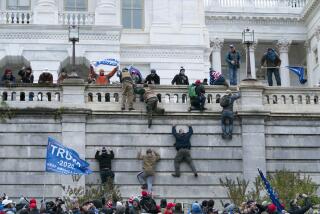Double Standards for Latin Democracy
- Share via
“I can’t move back home,” an internationally respected Central Amerian professional told me in August. “Things haven’t changed enough; my family wouldn’t be secure.” This was not a Nicaraguan expatriate opposed to the Sandinistas but a Guatemalan moderate who committed the indiscretion of favoring mild social reform.
“What we need is time,” said another Central American. “If we have a period of time without serious threat from subversives and without serious involvement (from abroad), we can increase our (combat) readiness.” This was not a Nicaraguan comandante looking to the day when the Contras are disarmed and democratization can be reversed. The speaker was Guatemala’s defense minister, Brig. Gen. Hector Alejandro Gramajo, assessing his army’s continuing counterinsurgency war, the casualties of which have been overwhelmingly unarmed civilians.
These two comments are not uniquely Guatemalan; they might refer to El Salvador or, to some extent, Honduras. This suggests that Washington officials are applying a double standard in Central America when they see problems only with Nicaragua and reduce the entire regional peace process to one simple question: “Will the Sandinistas really democratize?” Jeane Kirkpatrick even suggested in a recent column that “liberals” in Congress and in Central America would “lower the standards for democracy to permit the Sandinistas a ‘passing grade.’ ”
But who in Washington is asking whether Nicaragua’s neighbors are themselves acting in good faith in regard to the peace accords? Who is asking whether the generals in Guatemala, El Salvador or Honduras can really democratize? Who is asking what standards of democracy have been lowered (or ignored entirely) to permit a “passing grade” for these pro-American governments?
Ironically, the intellectual foundations for Washington’s double standards were erected by Kirkpatrick herself in a much-noted 1979 article, “Dictatorships and Double Standards.” In that article, while accusing the Carter Administration of applying a liberal-left “double standard,” she made the case for a U.S. policy of supporting right-wing “authoritarian” regimes in the Third World as preferable to left-wing “totalitarian” regimes--sometimes the only alternative.
In Guatemala, the United States has supported a series of military regimes whose counterinsurgency wars since the mid-1960s, among the most brutal in the Hemisphere, have left hundreds of thousands of civilian casualties. From 1978 to 1985 alone, the human cost of the Guatemalan security forces’ scorched-earth strategy included the burning to the ground of more than 440 villages and the killing or “disappearing” of 150,000 civilians. El Salvador’s war, which has been waged with heavy U.S. involvement, has cost at least 60,000 civilian lives since the late 1970s.
On the positive side, there are now elected civilian governments in place of military dictatorships in El Salvador, Guatemala and Honduras. In El Salvador and Guatemala there is increased space for political activity and limited social protest, and the volume of human-rights violations is greatly reduced. But in all three, the limits of the present political opening are set by the region’s ongoing counterinsurgency wars.
Guatemala’s war has left its imprimatur on every aspect of the society. It can be seen in the vast expanses of land that government troops burned in the highlands and in massive population migrations and relocations. And it can be seen in the continuing militarization of Guatemalan political life: Even outside the active “zones of conflict,” large areas of the countryside are kept in line through mandatory civilian defense patrols, “model villages” and other counterinsurgency institutions. While formal prohibitions on politics have been relaxed, opposition forces practice self-censorship, since they never know whether they will suffer reprisals for voicing protest. Guatemala’s military leaders have turned Clausewitz’s famous dictum around; they say that “politics is a continuation of war by other means.”
In Guatemala and El Salvador, political assassination and “disappearances” continue. Both countries’ presidents (Vinicio Cerezo Arevalo and Jose Napoleon Duarte) have promised not to prosecute army officers for past human-rights crimes or death-squad activities, thus granting them a shield of unaccountability in the present. And Honduras’ political life has been destablized and distorted by that country’s participation in the regional war.
Underneath a “democratic” surface, then, these countries are still governed by a logic of counterinsurgency that violates the requirements of an open society.
Most revealing is the situation of refugees and displaced persons in Washington’s “model democracies.” The war displaced well over 10% of Guatemala’s population (primarily highlands Indians). Since the army, which controls the repatriation program, regards the 150,000 refugees in Mexican camps as guerrilla collaborators or “subversives,” conditions for their return are insecure. Half a million are internally displaced in El Salvador and hundreds of thousands are refugees. In both cases, government programs fall far short of international humanitarian standards and those laid out in the peace accords.
Yet these realities are obliterated by Jeane Kirkpatrick’s flat assertions that “there would be no stream of refugees” and “there would be democracy, peace and development in Central America” if only Nicaragua were to “democratize”--that is, meet U.S. demands.
For eight years, this rigid, Manichaean logic has overshadowed every other logic in Washington and has justified its double standard. Is it not time to join with Central Americans and virtually the entire world in the drive toward peace and democracy throughout Central America?
DR, COURAGE BOYS--MISTER REAGAN IS WITH US, ROGER, Barricada, Managua
More to Read
Sign up for Essential California
The most important California stories and recommendations in your inbox every morning.
You may occasionally receive promotional content from the Los Angeles Times.










